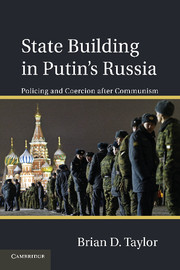Book contents
- Frontmatter
- Contents
- List of Figures, Tables, and Maps
- List of Abbreviations
- Acknowledgments
- Note on Transliteration and Translation
- Introduction
- 1 Bringing the Gun Back In
- 2 The Power Ministries and the Siloviki
- 3 Coercion and Capacity
- 4 Coercion and Capacity
- 5 Coercion and Quality
- 6 Coercion and Quality
- 7 Coercion in the North Caucasus
- 8 State Capacity and Quality Reconsidered
- Appendix A Publication Abbreviations
- Appendix B Interview Index
- References
- Index
- References
4 - Coercion and Capacity
Centralization and Federalism
Published online by Cambridge University Press: 04 February 2011
- Frontmatter
- Contents
- List of Figures, Tables, and Maps
- List of Abbreviations
- Acknowledgments
- Note on Transliteration and Translation
- Introduction
- 1 Bringing the Gun Back In
- 2 The Power Ministries and the Siloviki
- 3 Coercion and Capacity
- 4 Coercion and Capacity
- 5 Coercion and Quality
- 6 Coercion and Quality
- 7 Coercion in the North Caucasus
- 8 State Capacity and Quality Reconsidered
- Appendix A Publication Abbreviations
- Appendix B Interview Index
- References
- Index
- References
Summary
Everyone was saying that the administrative vertical had been destroyed and that it had to be restored.
Vladimir Putin, 2000Vladimir Putin first became familiar with the details of Russian federalism and regional politics in 1997–1998, when he worked in the presidential administration of Boris Yeltsin in two different positions concerning regional politics and relations with the heads of Russia's eighty-nine subunits (conventionally referred to as “governors”). It was at this time that “everyone was saying” that decentralization had gone too far and federal relations were in crisis, including (or perhaps especially) in the Kremlin. Putin became convinced that Russia did not have a “full-fledged federal state” but a “decentralized state,” and that “regional independence often is treated as permission for state disintegration.” This diagnosis was widely shared, not only in Russia but by many foreign experts.
“Strengthening vertical power” became a key slogan of Putin's presidency, especially in his first term. He was guided by his statist ideology and his belief, as his close ally Viktor Cherkesov put it, that in Russia, it has always been important “to have supreme state control over the activity of local bureaucrats.” It was particularly important to Putin that the central state reassert its control over the power ministries. This control had weakened considerably under Yeltsin, particularly in the law enforcement realm, but there were significant concerns about regionalization of the military as well. Powerful regional governors were seen as amassing substantial political, economic, and even coercive resources, which was of great concern to central authorities.
- Type
- Chapter
- Information
- State Building in Putin’s RussiaPolicing and Coercion after Communism, pp. 112 - 155Publisher: Cambridge University PressPrint publication year: 2011



